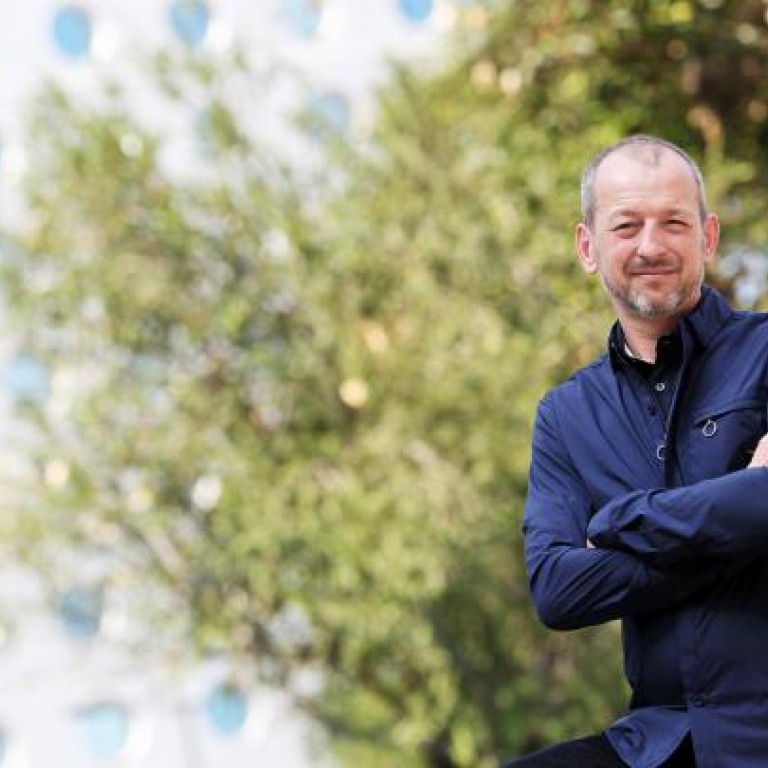
Special bike race for special needs school
Simon Mottram, a successful businessman and father of an autistic teenager, has revived a storied cycling relay, writes Jeanette Wang
Success can easily go to one's head, particularly for the boss of a company that's gone from zero to £18 million (HK$208 million) in sales in a short time. But there's another side to Simon Mottram's life: when he's not running Rapha, the London-based cycling apparel company he founded in 2004, he's running after his son Oscar.
"Oscar requires 24-hour-a-day care," says Mottram, 47, of his autistic 18-year-old son, the eldest of three children. "He has no sense of danger, he's not verbal, he's in nappies. So while he's a very happy, nice guy to have around, you have to be thinking about him all the time. It is constant attention, constant stress … it's quite a grind."
Mottram speaks openly about his son, but this wasn't always the case. "What we were doing with Rapha was so different from my life with [Oscar], I didn't want to use it as some kind of soap box."
We thought it'd be nice to resurrect one of these lost classic races and use it as a vehicle to raise money for the charity
But this year, he's found a reason to comfortably talk about both: the Rapha Bordeaux to Paris, a 600-kilometre team relay ride that aims to raise £250,000 for Ambitious about Autism, the charity behind Oscar's school - TreeHouse in north London.
Mottram says he always wanted Rapha to do some charity work, but turned down all pitches seeking the brand's involvement - until someone from Ambitious about Autism came to him last year for ideas and support for a fundraising ride. "We could only be involved if we could make it relevant for Rapha," says Mottram.
Bordeaux to Paris, a classic cycling race that ran from 1891 to 1988, tied in with Rapha's focus on cycling's rich history and lifestyle. This year marks the 25th anniversary of the last race, which was stopped due to lack of funding, and the 50th anniversary of Briton Tom Simpson's victory.
"We thought it'd be nice to resurrect one of these lost classic races and use it as a vehicle to raise money for the charity," says Mottram. If all goes to plan, he hopes to hold a "lost classic" charity event every year.
Participants pay a £975 entry fee and must raise £2,500 each. In teams of four, they must finish the ride in 24 hours. There is space for 25 teams.
The money goes to providing lifelong learning and support for young people and adults with autism, plus campaigning for greater understanding and provision. Mottram says support and funding for autism in Britain is "very thin", although it's still pretty good relative to funding in other European countries.
"We had to go fight the council to get them to fund [Oscar's] special education. They wanted to put him into a regular special needs school, and he needs specific care. So we took them to court and that cost us money and time," says Mottram.
"[Support] is getting better for small children because there have been lots more cases of autism in kids born in the past 10 years or so. But what happens when they become adults? I think nobody has worked it out."
Oscar, who was diagnosed at 20 months, has a developmental age of under two and is on the "more disabled end of the spectrum", says Mottram.
Life with Oscar is challenging, but Mottram says it can be incredibly rewarding, too. "He's very loving and takes huge pleasure in us and his siblings and music and going outside… Overall, it's not a terrible place to be. The problem is all in our heads; Oscar is actually really happy."
Work and cycling provide an escape for Mottram, who has been obsessed with the sport since he first watched the Tour de France on television at age 18. He rides three times a week, including a four-hour ride on Wednesday mornings.
"[Cycling] gives me perspective and complete distance, and that's really good," he says. "It's harder for my wife [Lucy] because she doesn't work … it's much harder for her to remain positive, I think."
Life with Oscar has changed their approach to raising their other two children, Connie, 16, a sprint athlete, and Felix, 11.
"We want our children to be happy and Oscar has really brought us that. We want them to fulfil their potential," says Lucy. "But it's also made us look closely at our lives and enjoy the good bits. We take very little for granted."
Mottram's personal life has helped keep his professional life on track. "It definitely helps me to be focused on Rapha being successful," he says, "because if I'm going to take all this time and energy and put it into something other than the family, it's got to be really good. And I'm sure that's given me more drive than I would've had otherwise."
